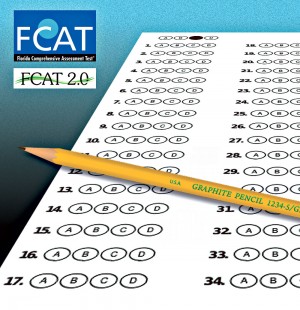School district leaders give state exam an F
- October 6, 2015
- / Reggie Dogan
- / education

School district superintendents across the state have no confidence in Florida’s standardized testing and accountability system, and they want to state education board to know it.
Realizing that there may be strength in numbers, the Florida Association of District School Superintendents is urging every district chief to attend the Florida Board of Education meeting on Oct. 28 in Kissimmee.
Santa Rosa schools superintendent Tim Wyrosdick will be front and center, joining school leaders around the state, to express his displeasure with the new Florida Standards Assessment, commonly called the FSA.
“I feel a strong superintendent presence is an indicator of the one voice we share concerning this failed accountability system,” Wyrosdick said. “I also feel it is very important to remind our state (education) board that superintendents support high rigor and academic performance.”
Education emerged in the 2014 Studer Community Institute Pensacola Metro Report as to top priority in improving the community's quality of life. Kindergarten readiness and graduation rates are two of the 16 metrics measured on the Pensacola metro dashboard, and standardized tests are a tool the state uses to gauge the progress of schools and academic achievement of students in area school districts.
Malcolm Thomas, Escambia schools superintendent, said he is working to clear his calendar to be able to attend the meeting later this month.
“We’ve been speaking out for years, and I’m hopeful now maybe others will start to listen,” Thomas said. ”We want to make sure that the accountability system is equitable and fair.”
There have been a lot of things said about the state’s standardized testing system in the past few years. “Fair and equitable” have not been a part of the discussion.
Parents and teachers for some time have complained that the Florida Comprehensive Assessment Tests put unnecessary pressure on students and dampened creativity in the classroom. The controversial exams determined whether third-grade students would be promoted to the fourth grade and whether high-school students would graduate. They were also used to award letter grades to schools.
Concerns and complaints about the new FSA reached a fever pitch after schools experienced a litany of problems when the exams rolled out in March. Technical and computer glitches and cyberattacks across the state forced school districts to postpone and suspend testing
Other problems stemmed from a review of the test content.It was revealed that only 65 percent of the third- and 10-grade English language exams matched the intended skills required to students. Similarly, only 79 percent of a seventh-grade math test aligned with intended state curriculum standards.
Nevertheless, an FSA validity study found the test to be reliable and an accurate measure of whether students mastered state academic standards. It concluded that FSA data can be used fairly in teacher evaluations and to calculate A-to-F grades for public schools.
Superintendents vehemently disagreed, and in a Sept. 25 letter from their association, they said: “We have witnessed the erosion of public support for an accountability system that was once a model for the nation. Florida school superintendents stand ready to wok with all stakeholders and the Department of Education to develop a viable accountability system and regain the trust of our students, teachers, parents and communities.”
The superintendents recommended that the state:
— suspend using FSA test scores for teacher evaluations or school grades in 2015.
— give all schools an I, indicating grades are incomplete this year. Seven other states have altered their grading systems this year to "mitigate negative consequences" from new tests, the superintendents said.
— as it works to set passing scores for the new FSA, reject the State Board of Education's push to match student performance on the FSA to that of the National Assessment of Educational Progress. Board members have said the recommended passing scores for FSA made so far are too low.
Critics of high-stakes testing have been trying to get education policymakers and politicians for years hear them out, to no avail.
Thomas believes the right people are finally listening, but more work needs to be done to fix the problems surrounding the state exam.
“I think the best way to get them to listen is to get people to understand more of what we’re dealing with,” Thomas said. “We’re not advocating for us; we’re advocating for our students.”
 CivicCon launches with a look at good growth in cities
CivicCon launches with a look at good growth in cities
 Building stronger brains one baby, one parent at a time
Building stronger brains one baby, one parent at a time
 SCI debuts commercial on Early Learning City
SCI debuts commercial on Early Learning City
 Entrecon: World class speakers and an opportunity to sharpen skills
Entrecon: World class speakers and an opportunity to sharpen skills
 PYP Quality of Life survey 2017
PYP Quality of Life survey 2017
 EntreCon Pensacola 2016: A look back
EntreCon Pensacola 2016: A look back
 Leadership tip: getting better employee takeaways
Leadership tip: getting better employee takeaways
 Leadership tip: be interested instead of interesting
Leadership tip: be interested instead of interesting
 Leadership tip: delivering difficult messages
Leadership tip: delivering difficult messages
 Brain Bags boost Arc, Early Childhood Court programs
Brain Bags boost Arc, Early Childhood Court programs